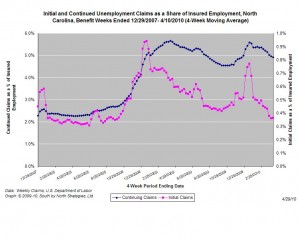29.04.2010
Policy Points
Economic policy reports, blog postings, and media stories of interest:
29.04.2010
Policy Points
From an opinion piece by Brad DeLong posted on Project Syndicate …
Despite the frequent cries of American Republicans that Barack Obama is trying to bring European-style socialism to the United States, it is now very clear that the US president wishes to govern from one place and one place only: the center.
…
In fighting the recession, Obama decided early on that he would push for a fiscal stimulus program about half the size of what his Democratic economic advisers recommended, and he decided to count that as a total victory rather than press for expanding half a loaf into the full amount.
…
Obama has been so committed to that cautious policy that even now, with the unemployment rate kissing 10%, he will not grab for the low-hanging fruit and call for an additional $200 billion of federal aid to the states over the next three years in order to prevent further layoffs of teachers. Rather than stemming further erosion of the national commitment to educate the next generation, Obama has shifted his focus to the long-term goal of balancing the budget – even while the macroeconomic storm is still raging.
29.04.2010
Policy Points
For the benefit week ending on April 10th, 14,716 North Carolinians filed initial claims for state unemployment insurance benefits, and 185,754 individuals applied for state-funded continuing benefits. Compared to the prior week, there were fewer initial and continuing claims. These figures come from data released today by the U.S. Department of Labor.
Averaging new and continuing claims over a four-week period — a process that helps adjust for seasonal fluctuations and better illustrates trends — shows that an average of 13,987 initial claims were filed over the last four weeks, along with an average of 189,285 claims. Compared to the previous four-week period, initial claims were higher and continuing claims were lower.
 One year ago, the four-week average for initial claims stood at 26,112 and the four-week average of continuing claims equaled 227,805.
One year ago, the four-week average for initial claims stood at 26,112 and the four-week average of continuing claims equaled 227,805.
The graph (right) shows the changes in unemployment insurance claims (as a share of covered employment) in North Carolina since the recession’s start in December 2007.
Both new and continuing claims appear to have peaked for this business cycle, and the four-week average of new claims has fallen to a level last seen in September 2008. Yet continuing claims remain at an elevated level, which suggests that unemployed individuals are finding it extremely difficult to find new positions.
28.04.2010
Policy Points
Economic policy reports, blog postings, and media stories of interest:
28.04.2010
Policy Points
From the Real Times Economics blog of The Wall Street Journal …
State Budgets: Jeffrey Clemens and Stephen Miran, both Ph.D. candidates at Harvard University’s economics department, measure the effects of cuts on state income and employment. “Our estimates suggest that $1 of mid-year budget cuts would reduce state income by around $1.70, and that $25,000 in cuts would result in the loss of a job. To the extent that federal aid to states prevents budget cuts of a similar nature, we would expect this aid to have similar effects on state economies. Although there may be differences between the programs impacted by budget rules and the programs impacted by federal aid to states, the evidence suggests that this type of fiscal policy is unambiguously expansionary.” They note, however, that it is tough to gauge the impact of stimulus spending. “The principal difficulty is that these cuts apply to programs and spending lines that previously existed and are presumably better planned than hastily organized stimulus programs which must quickly squeeze through administrative bottlenecks. Additionally, other spending which gets tagged as ’stimulus spending’ might more accurately be referred to as ’safety net spending’ and may have very different effects, in particular with regards to employment.”


 Email Sign-Up
Email Sign-Up RSS Feed
RSS Feed